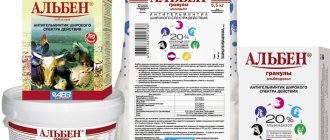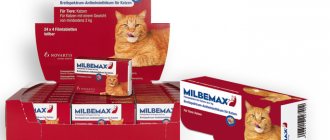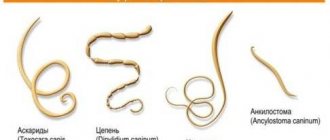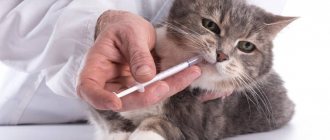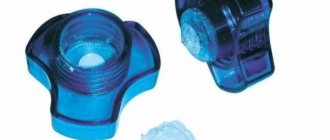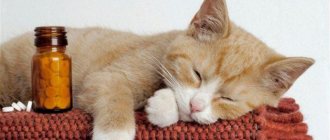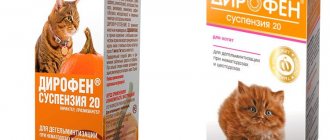All mammals, even domestic ones, are at risk of contracting helminthic infestations. Helminthiases occupy a leading position among all veterinary diseases. Failure to follow the care rules can lead to your pet becoming infected with nematodes. Therefore, veterinarians prescribe anthelmintic drugs for cats for therapeutic and preventive purposes. The choice of medication and its dosage directly depend on the weight, age, and condition of the pet. More about this.
It's very easy to catch helminths
Contraindications for use
Deworming for therapeutic and preventive purposes, despite the large selection of anthelmintic drugs, is not recommended for sick, weakened animals, cats that have been diagnosed with chronic viral and bacterial infections.
As already noted, you should not give anthelmintic drugs to cats in the early stages of pregnancy, kittens under three weeks of age, or animals weighing less than a kilogram.
The choice of anthelmintic drugs should be approached with special attention if animals have increased hypersensitivity to drugs, functional disorders of the liver, or genitourinary tract.
We invite you to join our Zen channel and group on VKontakte or Odnoklassniki, where new articles for pet owners are published.
Similar articles:
- Reparin-Helper - a regenerative medicine for cats
- Smecta for cats with diarrhea
- Painkillers for cats
Review of deworming medications for cats
The range of modern anthelmintics allows you to choose a medicine that suits your cat’s age and health condition. Anthelmintics are available in the form of tablets, suspensions, drops on the withers, pastes, injections, sugar cubes. Each form has its own set of active ingredients, contraindications, side effects, and price.
global $ads_google; //data-ad-slot=”2475549904″ $ads_google = empty($ads_google) ? false : true; ?> if ($ads_google == false) {?>
$ads_google = true; ?> } ?>
Based on the nature of their action, anthelmintic drugs are divided into highly specific and complex. The former are used for targeted treatment after the pathogen has been identified, and the latter for preventive purposes. Antihelmintics also differ in their mode of action. The death of parasites occurs as a result of:
- depression of the nervous system;
- paralysis of the muscular system;
- metabolic disorders;
- destruction of integumentary tissues.
If there are discrepancies in information sources, you must follow the instructions included in the package.
An overview of the most popular deworming remedies, which are most often recommended by veterinarians, is presented in the video:
Drops on the withers
| Name | Active substance | Frequency of application and duration of action | Dosage, | Average price, rub. | Photo |
| Inspector Total | Fipronil, moxidectin | Once for 2 months | 0.1 ml per 1 kg of weight | 300-350 | |
| Profender | Emodepside, praziquantel | Once per month | 0.35 ml per 2.5 kg | 850 | |
| Advocate | Imidacloprid, moxidectin | Once per month | 0.1 ml per 1 kg | 1200-1400 | |
| Dironet | Praziquantel, ivermectin | Once per month | 0.2 ml per 1 kg | 350-400 | |
| Broadline | Esprinomectin, praziquantel | Once per month | 0.3 ml per 2.5 kg | 700-800 | |
| Drontsit | Praziquantel | Once per month | 0.5 ml per 2.5 kg | 300-250 |
The liquid, which is poisonous to parasites, is contained in a disposable pipette. Drops are applied to intact skin on the withers along the spine, that is, where the cat cannot lick off the medicine. After applying the drip drug, the pet cannot be bathed for four days, and it is not advisable to stroke or pick it up for 24 hours. The active substances penetrate the blood and, having reached the localization site of the helminths, infect them. Some anthelmintic drugs act without penetrating the vascular barrier.
Suspensions
| Name | Active substance | Frequency of application and duration of action | Dosage | Average price, rub. | Photo |
| Dironet | Pyrantel pamoate, praziquantel, ivermectin | Once per month | 1 ml per 1 kg | 150-200 | |
| Piradek | Pyrantel pamoate | Once for 3 months | 1 ml per 1 kg | 100-300 | |
| Prazicide | Praziquantel, pyrantel | Once for 3 months | 1 ml per 1 kg | 100-150 | |
| Febtal combo | Praziquantel, albendazole | Once for 3 months | 1 ml per 1 kg | 150-200 | |
| Prazitel | Praziquantel, pyrantel pamoate | Once for 3 months | 1 ml per 1 kg | 150-300 | |
| Celandine | Praziquantel, pyrantel pamoate | Once for 3 months | 1 ml per 1 kg | 100-150 |
The anthelmintic agent in the form of a suspension is shaken before use. If you need to give a small dose of medicine, it is advisable to first dilute it with a small amount of boiled water. The need for a diet or the use of a laxative is prescribed only for those remedies that act on an empty stomach. The suspension is injected onto the root of the cat's tongue using a plastic measuring syringe.
global $ads_google; //data-ad-slot=”2475549904″ $ads_google = empty($ads_google) ? false : true; ?> if ($ads_google == false) {?>
$ads_google = true; ?> } ?>
Pills
| Name | Active substance | Frequency of application and duration of action | Dosage | Average price, rub. | Photo |
| Azinox | Praziquantel | Once for 3 months | 0.5 mg per 10 kg | 100-150 | |
| Alben S | Praziquantel, albendazole | Once for 3 months | 0.6 mg per 5 kg | 100-150 | |
| Dironet | Pyrantel pamoate, praziquantel, ivermectin | Once for 3 months | 0.5 mg per 10 kg | 100-200 | |
| Dirofen | Pyrantel, fenbendazole | Once for 3 months | 200 mg per 5 kg | 200-350 | |
| Drontal | Praziquantel, pyrantel embonate | Once for 3 months | 350 mg per 4 kg | 300-350 | |
| Kanikquantel Plus | Praziquanten, fenbendazole | Repeat after 2-3 weeks for 3 months | 550 mg per 10 kg | 100-200 |
The tablet form of anthelmintics is considered the most common. Tablets and capsules do not require special storage conditions. The need to abstain from food for each type of deworming tablet is prescribed in the instructions.
Products for kittens
It is advisable that antihelminthic drugs for young cats be prescribed by a veterinarian. They must be safe, low-toxic and effective against parasites. It is not advisable to dilute the suspension or divide tablets intended for adult cats. Pet pharmacies have products intended specifically for kittens.
From the age of three weeks, babies are allowed to be given Drontal, Prazicide, Trontsil K, Kanikvantel for deworming. For five-week-old kittens, the deworming drug Profender is intended, and from six-week-old kittens - Milbemax. When three months are reached, the permitted list is supplemented by Pratel, Febtal, Polyverkan, and Inspector.
Milbemax
Anthelmintic tablets for kittens contain milbemycin and praziquantel as active ingredients. Thanks to its complex action, the anthelmintic is effective in combating various parasites. The medicine belongs to the group of moderately dangerous and in recommended quantities is not toxic to a growing organism. To achieve an anthelmintic result, a kitten weighing 0.5-1 kg requires 1/2 tablet. The advantage of the drug is that it can be given to the kitten along with food without laxatives. The cost of Milbemax for kittens is from 150 rubles.
Poliverkan
The sweet anthelmintic drug is available in the form of sugar cubes weighing 8 grams each. The therapeutic effect is due to the combination of oxybendazole and niclosamide. Polyvercan is prescribed to young cats whose weight exceeds 1 kg. The dose consists of half a cube per 1-5 kg of animal weight. It is added to the kitten's food or dissolved in drinking water. For treatment purposes, the dose is repeated after 10 days. And then they give the pet a prophylactic dose once a quarter. The average price for sugar cubes, packaged in eight pieces, is 400 rubles.
Symptoms of helminth infection
global $ads_google; //data-ad-slot=”2475549904″ $ads_google = empty($ads_google) ? false : true; ?> if ($ads_google == false) {?>
$ads_google = true; ?> } ?>
When parasites enter an animal’s body and begin to actively multiply, this manifests itself at the physiological and behavioral levels. There are signs that suggest the presence of a helminthic infestation. Conventionally, they are divided into two groups: general symptoms and specific, that is, characteristic of a disease caused by a specific pathogen. The manifestation of symptoms is influenced not only by the type of parasite, but also by the general health of the cat, its age and body weight, and the duration of helminthiasis. Common features include:
- change in appetite;
- weight loss;
- periodic seizures;
- lethargy and apathy;
- hair loss;
- skin lightening;
- eye discharge;
- digestive changes.
Kittens may experience delays in growth and development. This is especially noticeable when compared with healthy kittens of the same age. In parallel with these general abnormalities, the cat exhibits special signs that may indicate the presence of a specific pathogen in the body. Many symptoms overlap:
| Symptom/Parasite | Roundworms | Nematodes | Lungworms | Tapeworms | Heartworms | Stomach worms |
| Barrel belly | + | + | + | |||
| Dehydration | + | |||||
| Vomit | + | + | + | + | + | |
| Diarrhea | + | + | ||||
| Anemia | + | + | ||||
| Blood in stool | + | + | + | |||
| Abdominal pain | + | + | ||||
| Cough | + | + | ||||
| Wheezing | + | + | ||||
| Temperature | + | |||||
| Rash around the anus | + | |||||
| Worms in feces | + | + | ||||
| Weight loss | + | + | + |
If even one symptom appears, you must contact a veterinary clinic for testing and diagnosing the disease.
The veterinarian prescribes a laboratory test of blood, stool, saliva, and smear. Helminthoovoscopic and helmintholarvoscopic methods help to establish an accurate clinical picture. Many signs can signal the progression of functional diseases in a cat, so an examination by a veterinarian to clarify the causes is mandatory.
Can there be side effects?
When giving your cat deworming medication, you need to be aware of the side effects. They are possible in case of individual intolerance to the drug, poor health, overdose, or exceeding the shelf life of the drug. If your cat experiences at least one negative effect, you should consult your veterinarian. Side effects include:
- vomiting and/or diarrhea;
- muscle tremors;
- difficulty breathing;
- paleness of the integument;
- lethargy and apathy.
You cannot give several anti-worm medications to your cat at once. This can cause severe poisoning.
To speed up your pet’s recovery, reduce intoxication from anthelmintics, and improve the condition of the intestines when removing dead helminths, veterinarians prescribe special sorbent preparations. The veterinarian talks about the need for such funds:



